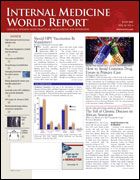Publication
Article
Internal Medicine World Report
HPV Implicated in Oral Cancer
Author(s):
Compelling New Evidence
Human papillomavirus (HPV) is known to cause cervical cancer, but until now its connection with oral cancer was based primarily on molecular data. A new epidemiologic study has now provided compelling support for this relationship.
N Engl J Med
This case-control study included 100 patients with newly diagnosed oral cancer and another 200 patients without cancer who served as controls (. 2007;356:1944-1956).
Multivariate analysis showed that oropharyngeal cancer was 32 times more likely in patients who had been orally infected with HPV. Oral infection with HPV was the strongest risk factor for oral cancer, regardless of tobacco or alcohol use.
"It's the virus that drives the cancer," says coauthor Maura Gillison, MD, PhD, of Johns Hopkins University, Baltimore. "Since HPV has already disrupted the cell enough to steer its change to cancer, then tobacco and alcohol use may have no further impact."
Oral HPV infection appears to be sexually acquired, since the risk for oropharyngeal cancer increases with increasing numbers of lifetime vaginal and oral sex partners.
Dr Gillison emphasizes that oral cancer is relatively uncommon, and the vast majority of individuals with oral HPV infection will never develop it.
However, notes coauthor Gypsyamber D'Souza, PhD, also of Johns Hopkins University, "It is important for healthcare providers to know that people without the traditional risk factors of tobacco and alcohol use can nevertheless be at risk for oropharyngeal cancer."
While acknowledging that a single study is not incontrovertible proof of a cause-and-effect relationship, the investigators postulate that their results confirm and extend those of previous case-control studies and provide further support for HPV vaccination—in boys, as well as girls, since oropharyngeal cancer is not bound by gender.





